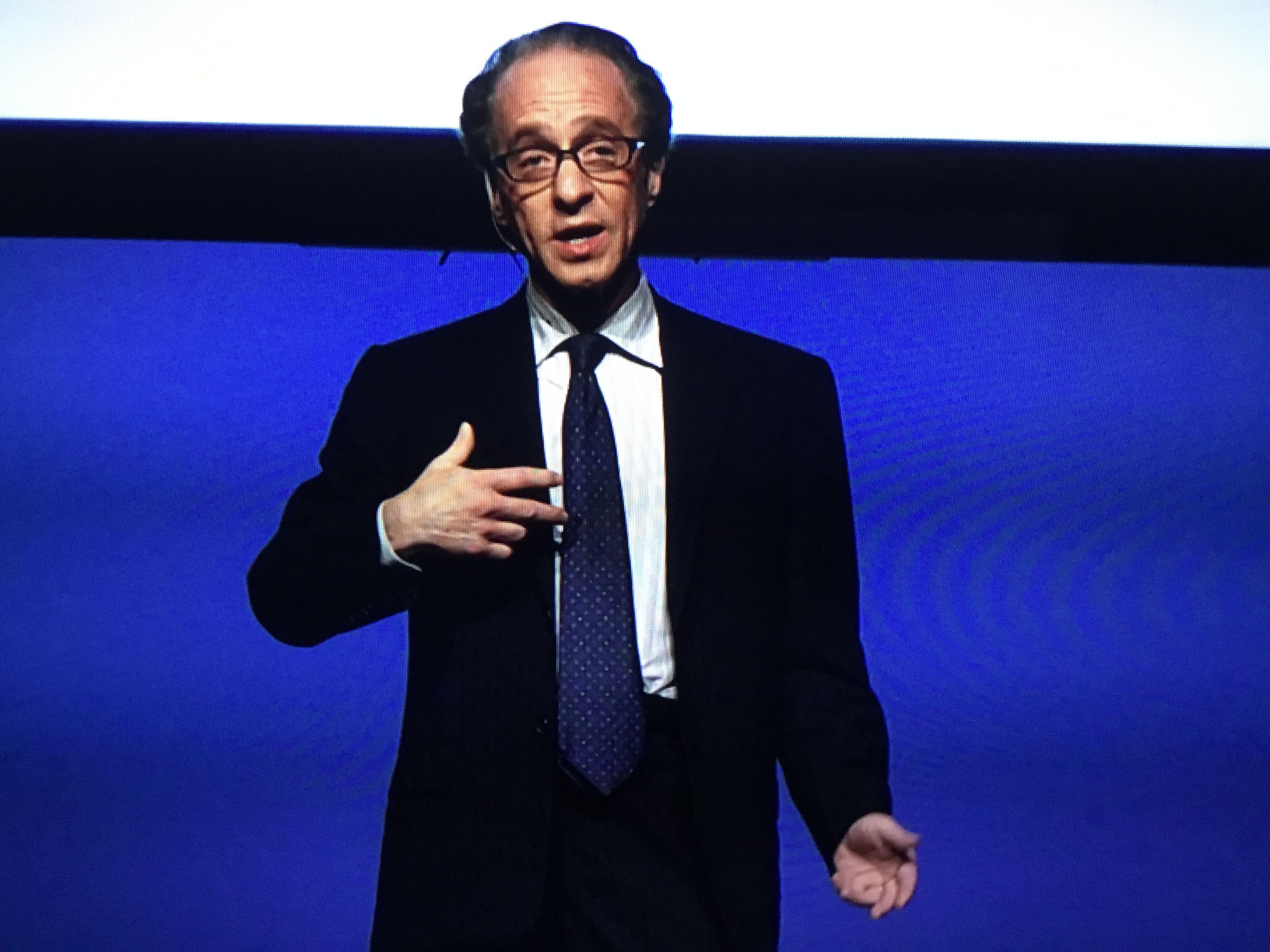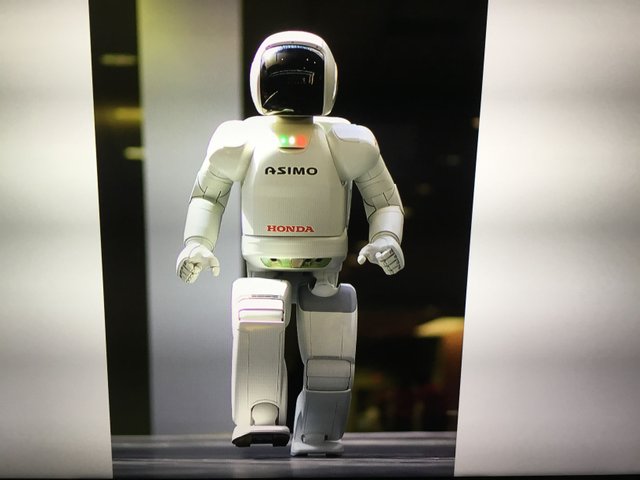Ray Kurzweil and the Robot Problem
RAY KURZWEIL AND THE ROBOT PROBLEM
In a recent interview, inventor and entrepreneur Ray Kurzweil addressed an issue to do with robots that you might well have come across. Namely, that such machines could be a threat to jobs.
Kurzweil is hardly the first person to discuss this issue. But his take on the subject is worth mentioning because he appears to have a novel reason for believing that the age of intelligent machines will not lead to a ‘job apocalypse’.

(Ray Kurzweil. Image from wikimedia commons)
Before getting to Kurzweil’s proposed solution, let’s have a review of older dismissals of concerns over job obsolescence. I believe most of these to be flawed in one way or another.
One: These Robots Aren’t So Great.
Often, when concerns are raised that technology is poised to take people’s jobs, we are encouraged to ignore those stage-managed promotional videos depicting Asimo boldly walking up a flight of stairs while carrying a parcel (watch out, delivery workers, he is about to displace you!) and instead watch something like that DARPA challenge where robots competed to negotiate an obstacle course and achieve feats like opening a door.
Under less-than-controlled conditions, robots tend to do rather poorly, and take too much time to accomplish tasks humans can be expected to complete effortlessly. Although robots are often depicted as humanoid machines displacing blue-collar workers from manual jobs, the truth is that artificial intelligence is much better at thinking than doing. One of the surprising aspects of making intelligent machines is that ‘the hard problems are easy while the easy problems are hard’. What that means is that feats we find hard to do and have to go through further education or some kind of intense training before we become competent, have been accomplished by robots before they mastered everyday tasks we can do without a second thought.
This might sound like a worrying trend. If it is true, does it mean those careers we aspire to and enrol at university in order to obtain will be lost to AI, leaving us to scrub toilets? At the moment such fears are misplaced because the AI that exists is really only useful as an aid to human workers. Siri and Alexa have their uses but they are not ready yet to make that lawyer, personal assistant, doctor or shop assistant obsolete.

(Asimo. Not quite ready to take your job. Image from Wikipedia)
However, the key word to note there is ‘yet’. Yes, today’s deep-learning algorithms cannot replace employees but technology continues to evolve. Just as today’s software and machines can do things once considered beyond the capability of technology, so too will future machines be capable of tasks we currently understand to be achievable only by humans. So while the limited ability of current AI may give cause to relax, tomorrow things could be different.
Two: This is nothing new
Another popular retort is to claim that there is nothing new about technology displacing jobs. There is some truth in this. Today, if you mention the word ‘computer’ to anyone, they are bound to think of a Windows PC, an Apple laptop or something like that. Originally, though, ‘computer’ was not a gadget at all, it was a job description. It referred to people who were employed to run rote calculations in astronomy and stuff like that. When fast calculating machines were invented (fast for the time, that is) their speed and accuracy meant there was no need to pay people to work through the math anymore.
This, however, did not mean the end of employment, because while computers did close down one avenue of work they opened up plenty more. Just think of all the ways of making money that have been created since the World Wide Web went live.
But should we really expect this to continue as AI and robotics grow in capability? Perhaps not. The thing to bare in mind is that all machines in the past have been highly specialised, able to do one or a few tasks extraordinarily well but unable to expand beyond this limited range. Humans, on the other hand, are much more adaptable and capable of learning new tasks. The goal of AI researchers is to imbue machines with that ability to learn, and the idea of a ‘technological singularity’ that Kurzweil has promoted foresees a future in which artificial intelligence is not merely as good at learning and adapting to new tasks but superior in such abilities to most, if not all, humans. If such a world were to come about, it’s not clear how people would be in a position to take new jobs before technology renders their employability in that area obsolete.
Three: Those farmers are still employed
This is a variant on the refutation mentioned above. When technological unemployment is mentioned, the discussion often turns to agriculture. We are reminded how, long ago, more than 90% of workers laboured away on the land. As farms modernised that number was drastically reduced, to the point where something like 2% now work to produce the food the rest of us rely on. However, the remaining 98% were not permanently unemployable, because new jobs in industry, service and other sectors were created.
It is not the case, however, that farmers left their fields to seek new jobs in the city. It was more a case of their sons or granddaughters looking to new horizons. When change is happening over generations there is enough time to establish the infrastructure to educate people for slowly-changing circumstances. It’s also worth noting that, since people generally moved from fairly routine work on farms to fairly routine work in industry to fairly routine work in service and administration, it was not too difficult to imagine where people might have looked for work when one avenue closed.
But Kurzweil has highlighted a phenomenon he calls the ‘law of accelerating returns’. According to this law, technological evolution does not follow a linear path but an exponential one. Indeed, Kurzweil claims this law applies not just to technology but can be traced right back to the Big Bang. If progress is exponential, then that has profound implications for the future. It suggests that a time may come when the world goes through profound changes not in centuries, nor even decades but in timespans measured in years or perhaps even shorter periods of time. If so, and particularly if we combine this with the aforementioned phenomenon of machines acquiring the ability to learn and adapt and so handle non-routine jobs, it is hard to imagine how people could keep up and re-educate themselves. It takes quite a few years to go through higher education, so what use is that if and when the world is utterly changing and rendering your hard-won skills obsolete in half the time or less?
Kurzweil’s solution
So now I come, finally, to Kurzweil’s solution. Relax, he tells us. AI is not some alien force come to take over the world, it is just part of the ongoing co-evolution between humans and their technology. It is true that humans and tech co-evolve. It was through manipulating materials that we evolved the hands and the dexterity to fashion those materials into intricate tools. Thanks to brain-scanning tech we can now see that using tools reshapes our minds. Professional violin players, for example, show greater activity in the area of the brain that controls their fingers. Presumably the brain has rewired itself to enable them to achieve their virtuosity. We adapt the world to our needs and adapt to the world we have created.
If you follow the evolution of computers certain things pop out, and the most important given our topic of discussion is ‘smaller, cheaper, more powerful, more personal’. The very first computers were utter behemoths that filled entire rooms. They were so expensive that only governments and major businesses could afford them, and they were so tricky to operate that only highly specialised technicians were allowed anywhere near them.
Over time, this changed. Computers went from filling rooms to sitting on our desks, to sitting on our laps, to becoming smartphones we carry around with us all the time. Their accessibility improved too, both in terms of affordability and ease of use. Following this trend, you can also see computers becoming more personal, beginning as remote machines available only to elites, to constant companions we take everywhere with us.
Assuming this continues into the future, what might tomorrow’s computing look like? Visionaries like Kurzweil have imagined machines with more computational power than today’s supercomputers, squeezed into a package no larger than a blood-cell. Such ‘nano-computers’ (named after the nanoscale size of their component parts) would literally be part of us, not just in our pockets but in our bloodstream or brains, interfacing with our nervous system and neural net and massively augmenting our cognitive abilities. We would no longer type a search into Google or say ‘hey, Siri’’, the mere desire to know something would wirelessly connect our minds to an external, all-knowing super Web.
If this future is realised, then there may never be a time when the wave of technology sweeps over us and leaves us behind as robots progress to unimaginable feats of accomplishment. We would continue to evolve, to blur the distinction between humanity and technology. We would become more-than-human and go forth into the age of intelligent machines not as obsoletes but partners in a brave new world and an exciting future.
REFERENCES
‘The Singularity Is Near’ by Ray Kurzweil
keep posting you are great
and also upvote me thanks
kurzweil opinions are so true, i dont think robots will take jobs away from humans, that a very wrong notion for anyone to concieve, people will need to make the robot work, its just a matter of having forsight and delving into fields that would be relevant for the future, yes some jobs would phase out but like kurzweil rightly said there will be more jobs extending out of these innovations.
Maybe one day robots will make robots? If Kurzweil is correct and AI will one day be smarter than people, they should be able to make better robots than us, right?
If Robots will create robots then it must be faultless but yet there has very few possibilities of such improvement of tech in this field. Nevertheless this is not happening and neither the unemployment will be such amount.
Good post
Thanks sir sharing informative and valuable .Robot is the famous in the world..
Ray Kurzweil is the best man ever about robot. Good post
Well its horrible to some extent but I think the bots are not yet going to take the jobs away.. Not at least yet.. May be they will sometime when they have advanced enough to take up the human intelligence.. But yet artificial intelligence is not much evolved..
I don't understand how you're not getting more attention.
great writing!